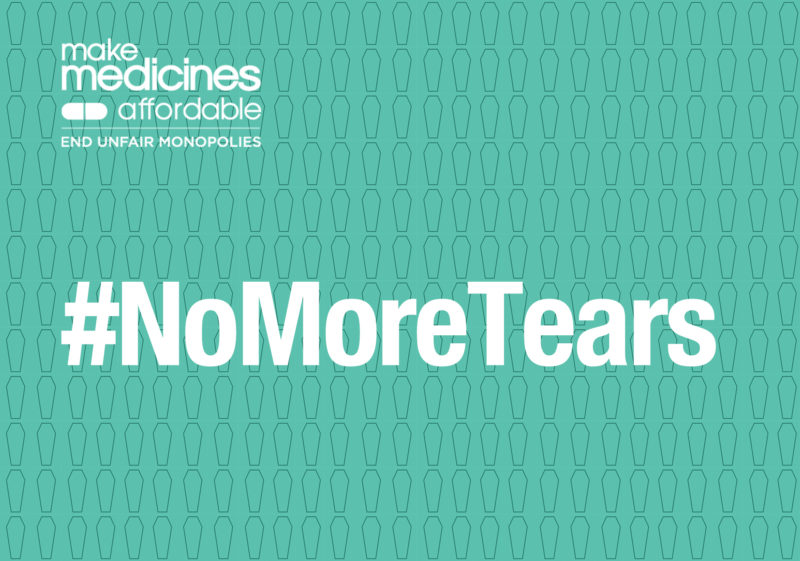
Sergey Kondratyuk
Sergey Kondratyuk manages ITPC’s Make Medicines Affordable campaign, is a member of the Global TB Community Advisory Board (CAB), and a TB-survivor caregiver.
Johnson & Johnson, a brand built on images of happy gurgling babies and the tagline ‘no more tears’, has the ability to prevent 395 families from mourning the death of their child, each and every day. Yet it doesn’t.
Last year, a total of 1.2 million people died from TB despite it being curable. J&J is the patent holder of bedaquiline, a drug that has saved millions of lives, but J&Js spurious pricing policy means it has also denied life to millions of others.
When overpriced drugs have proven to be a barrier to life, why should we trust J&J, a key-player in trials for COVID-19 vaccines, any more with our lives with coronavirus, than we’ve been able to with TB?
When you lose a loved one, whether from TB, coronavirus, or for other reasons, the cause of death is secondary to your loss. To J&J, it seems your life is secondary to profit.

This year, the 51st Union World Conference on Lung Health is underlining the right to health. The right to health, in this case lung health, is the same whether your vital organs are affected by TB, cancer, or other illnesses, and now, COVID-19.
The right to health is the same regardless of which illness you are affected by.
It is an easy principle to agree with. That everyone has the right to health, and that this right is equal. That means that no one person is more ‘deserving’ or more prioritised than another. That access to treatment is equitable, no matter where you live, what your socio-economic circumstances are, or what political or discriminatory factors you may face.
Treatment activists hope that the impetus to find and roll-out effective COVID-19 medicines could result in the type of equitable access that has so far evaded the TB response.
But why would it be different?
An understandable, natural reaction from many people might be that it’s both obvious and urgent that treatment simply has be found, and it will be for everyone, due to the enormity of the problem, because ‘coronavirus is killing so many people’.
But so is TB. TB resulted in the death of 1.2 million people in 2019. 12% of them were children.
That’s 144,000 dead children last year alone. 395 needlessly grieving parents every day.
So far, in actual numbers across 2019-20, that’s more than COVID-19.
It’s shocking isn’t it? To think another illness of a similar scale has gone comparatively unnoticed in many countries.
TB has taught us that, sadly, the size of the problem doesn’t guarantee sustained action, or fairness.
For years TB has held the unenviable record of being the world’s largest infectious disease killer. COVID-19 has resulted in 1.13 million recorded deaths since the start of the pandemic, so in annual terms it has now overtaken TB. It is a devastating fact. Also devastating, is the realisation that, when comparing it to the TB example, scale alone does not guarantee sustained global action, or equitable access.
Brilliant drugs, thanks to you.
While there are many unfortunate parallels between TB and COVID-19: the number of people affected; the fact that they are both airborne; and both attack the lungs, TB has one important difference – it is both preventable and curable.
To many people, TB is a thing of the past, a faded scar on your left arm from your vaccination. It is not a concern, as it’s probably been more-or-less eradicated in your country. The drugs exist, both to prevent you and your kids from ever getting TB, or treating and curing you if you did. But that makes it more unfathomable – the drugs exist to save lives, yet it still killed 1.2 million people last year?
TB, like COVID-19, is not an easy thing to treat: In the past, and for many still now, it can take up to 20 months of toxic treatment, with months at a time spent in hospital; it’s a challenging treatment to adhere to, what with side-effects, childcare, work and paying bills to compete with; it becomes resistant to different drugs; a lot of research and development is needed to keep up. It’s exhausting. The good news is that the R&D has paid off.
The public invested in the drug development, and the public needs access to that same drug.
Since 2013, bedaquiline has been recommended as a core component in the treatment of multi-drug resistant TB. Johnson and Johnson’s own investment into the drug benefitted from MUCH LARGER public investments from governments and non-profit entities, and now the public needs to recoup its significant investment.
The drugs exist. But maybe not for you.
This is not a new story. Even though public investment routinely goes into drug development, if patents are granted to a corporation it gives them carte blanche to inflate the prices of medicines. Due to an exponential surge in patent applications over recent years, patent offices around the world are overwhelmed. The patent system has been deliberately swamped by companies submitting multiple applications, on the same drug, and systematically submitting these country by country, especially those where there’s the most profit to be made. Most of these patent applications are unjustified or can be legitimately challenged.
This is exactly the approach Johnson and Johnson has taken on bedaquline, submitting multiple patent applications, in multiple countries. They are simply doing what most pharmaceutical companies do. ‘Playing the system’ has become the norm. It doesn’t make it right though, as the 345 families saying goodbye to their children today can testify to.
Overpricing is the norm. IT DOESN’T MAKE IT RIGHT.
What is happening with TB and other lifesaving drugs must be a warning sign for people optimistic about COVID-19 treatments and vaccines to act now. If TB hasn’t changed the routine tactics of pharmaceutical companies; if HIV hasn’t; if cancer hasn’t; if rare childhood illnesses haven’t; why will COVID-19?
What do we do?
As patents are applied for on a case-by-case, country-by-country basis, that means much of our work also has to take place at country-level, challenging unmerited patents one-by-one. But the abuse of the patent system is global and systematic, and so our strategies are also designed to have a global impact.
The Make Medicines Affordable campaign, led by ITPC and partners, believes it is everyone’s right to access the medicines they need. As such, we’ve joined calls for all COVID-19 diagnostics, treatments and vaccines to be patent free. It would be immoral to profit off a pandemic, especially as the drugs can be produced cheaply. Research by the University of Liverpool, which we supported, found that all drugs currently being repurposed for use in trial treatments for COVID-19 could be produced for around a dollar or day, or even less.
Intellectual property (IP) barriers have been created by industry, which affect pricing, the sharing knowledge or ‘tech transfer’, manufacturing capacity and supply chains. They are all surmountable if there is willing from the industry. History tells us not to rely on that being forthcoming. We can expect some lip-service, some ambiguous promises, as we’ve seen already, but if companies get their own way this will be followed by hollow arguments and hefty profits. If the pharmaceutical industry makes allowances for COVID-19, it will be harder for them to explain why they couldn’t do the same for other crises and epidemics.
Afterall, how does a pharma CEO on $25 million a year explain why someone dying of TB is less important than someone diagnosed with COVID-19?
Whether people live in poverty, or in presidential homes, access to treatment must be equal.
Whether people live in poverty or in presidential homes, access to life-saving medicines must be equitable. We’re closing in on J&J’s overpriced TB drug, with targeted civil society action. Nine patent oppositions have been submitted on bedaquiline to date, six of them by our campaign partners.
Civil society action has resulted in price reductions, even before patents have been rejected, but they don’t go far enough.
As with repurposed COVID-19 drugs, bedaquiline can also be produced for less than $1 per day, which includes a healthy profit. Again, as is also the case with COVID-19, we cannot accept concessions. The fair price is the fair price. A cent more means the company remains more concerned with their share price – and they are trading with your life.




